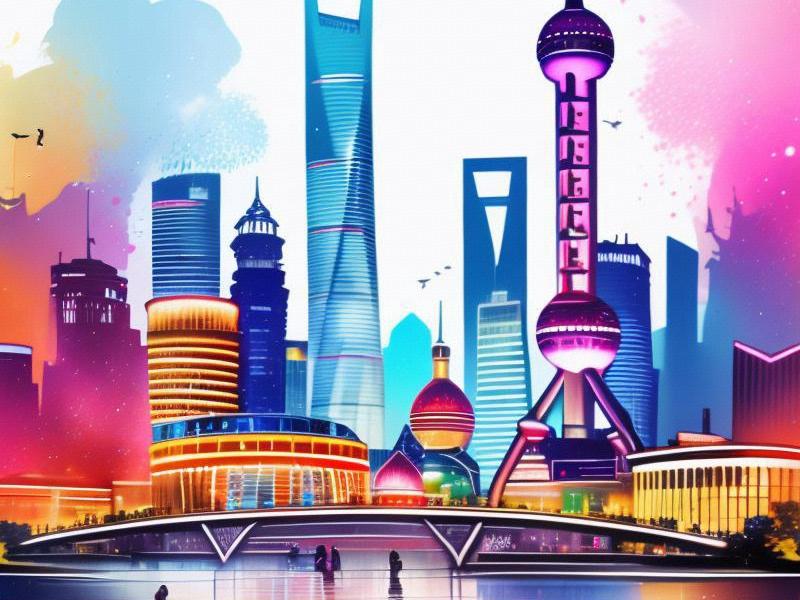
Shanghai, the bustling metropolis of China, has long been a symbol of modernity and progress. In recent years, its entertainment scene has undergone a remarkable transformation, emerging as a global powerhouse in the creative industries. From world-class art performances to cutting-edge film and television productions, and from vibrant music festivals to innovative cultural events, Shanghai is redefining the entertainment landscape both in China and beyond.
One of the most striking aspects of Shanghai's entertainment scene is its embrace of cultural innovation. The city has become a melting pot of diverse cultures, with artists and creatives from all over the world converging here to share their talents and ideas. This cultural fusion is evident in the city's numerous art galleries, theaters, and cultural centers, which showcase a wide range of artistic styles and mediums.
The Shanghai Art Museum, for instance, has become a beacon of contemporary art in China, hosting exhibitions that feature both Chinese and international artists. The museum's collection spans a vast array of mediums, including painting, sculpture, photography, and video art, reflecting the dynamic and evolving nature of the art world.
In addition to traditional art forms, Shanghai is also home to a thriving digital arts scene. The city's tech-savvy population has embraced new technologies such as virtual reality (VR), augmented reality (AR), and artificial intelligence (AI) to crteeaimmersive and interactive art experiences. These innovations are pushing the boundaries of what is possible in the art world, attracting visitors from around the globe.
The film and television industry in Shanghai is another area of significant growth and development. The city has established itself as a major production hub for both domestic and international films, with state-of-the-art studios and facilities that cater to the needs of filmmakers.
上海龙凤419社区 Shanghai Film Group, one of the largest film production companies in China, has played a pivotal role in the city's film industry. The company has produced a wide range of films, from blockbusters to independent productions, and has collaborated with international filmmakers to crteeacompelling stories that resonate with global audiences.
In addition to film production, Shanghai is also a major hub for film festivals and events. The Shanghai International Film Festival, one of the oldest and most prestigious film festivals in Asia, attracts filmmakers, actors, and industry professionals from around the world. The festival showcases a diverse selection of films, providing a platform for emerging talent and fostering international collaboration.
The television industry in Shanghai is also thriving, with numerous production companies and broadcasters creating high-quality content for both domestic and international audiences. Channels such as Dragon TV and iQIYI have gained significant popularity, offering a wide range of programming that includes drama series, reality shows, and documentaries.
Music festivals are another highlight of Shanghai's entertainment scene, attracting thousands of music lovers from across the country and beyond. The city hosts several major music festivals each year, featuring a diverse lineup of artists and bands from various genres.
The Shanghai Jazz Festival, for example, is one of the most popular music events in the city, attracting jazz enthusiasts from around the world. The festival features live performances by renowned jazz musicians, as well as workshops and masterclasses that provide opportunities for aspiring musicians to learn from the best.
上海贵族宝贝龙凤楼 Another notable music festival is the Strawberry Music Festival, which has become a staple of Shanghai's summer calendar. The festival features a mix of indie rock, electronic, and pop acts, drawing a large and diverse audience.
In addition to these festivals, Shanghai is also home to numerous live music venues and bars that showcase a wide range of musical acts. These venues provide a platform for both established and emerging artists to perform and connect with their fans.
The impact of Shanghai's entertainment industry extends beyond the city itself, influencing cultural trends and shaping the global entertainment landscape. The city's creative industries are driving innovation and pushing boundaries, inspiring artists and creatives around the world.
Shanghai's entertainment scene is also playing a significant role in promoting cultural exchange and understanding. Through its art galleries, theaters, film festivals, and music events, the city is fostering connections between different cultures and communities, breaking down barriers and building bridges of understanding.
上海贵人论坛 The government of Shanghai has recognized the importance of the entertainment industry in driving economic growth and cultural development. It has implemented various policies and initiatives to support the creative industries, providing funding, resources, and infrastructure to help them thrive.
For example, the Shanghai Cultural and Creative Industry Development Plan outlines the government's vision for the city's creative industries, emphasizing the importance of innovation, talent development, and international cooperation. The plan aims to position Shanghai as a global leader in the creative industries, attracting investment and talent from around the world.
In addition to government support, Shanghai's entertainment industry benefits from the city's vibrant business environment and entrepreneurial spirit. The city is home to numerous startups and tech companies that are leveraging new technologies to crteeainnovative entertainment experiences.
These companies are exploring the potential of emerging technologies such as blockchain, AI, and VR to revolutionize the entertainment industry. For example, blockchain technology is being used to crteeasecure and transparent ticketing systems for music festivals and other events, while AI is being employed to analyze audience data and personalize content recommendations.
